Book 1 Unit1 Friendship高一人教版英语第一模块第一单元词汇语法综合练习
- 格式:doc
- 大小:32.50 KB
- 文档页数:6
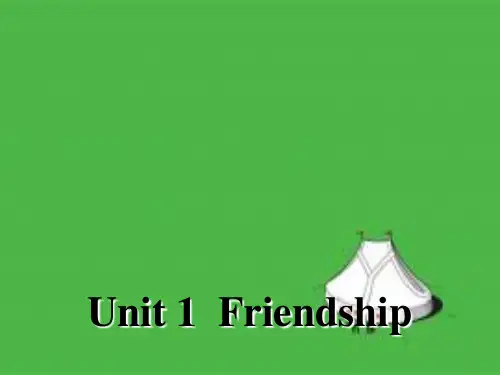

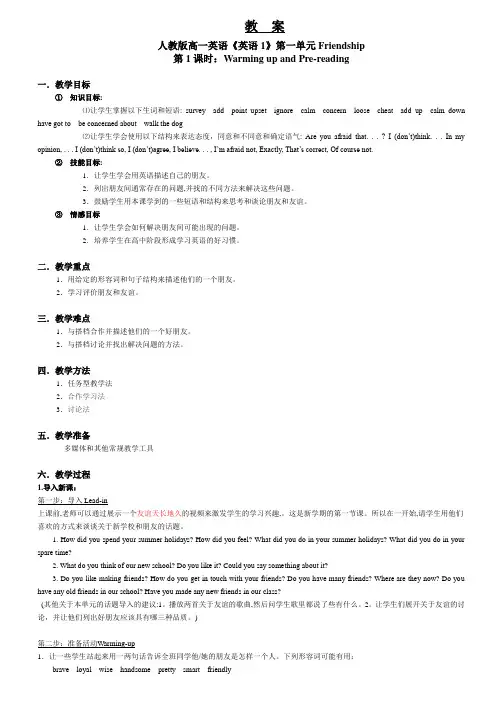
教案人教版高一英语《英语1》第一单元Friendship第1课时:Warming up and Pre-reading一.教学目标①知识目标:⑴让学生掌握以下生词和短语: survey add point upset ignore calm concern loose cheat add up calm down have got to be concerned about walk the dog⑵让学生学会使用以下结构来表达态度,同意和不同意和确定语气: Are you afraid that. . . ? I (don’t)think. . . In my opinion, . . . I (don’t)think so, I (don’t)agree, I believe. . . , I’m afraid not, Exactly, That’s correct, Of course not.②技能目标:1.让学生学会用英语描述自己的朋友。
2.列出朋友间通常存在的问题,并找的不同方法来解决这些问题。
3.鼓励学生用本课学到的一些短语和结构来思考和谈论朋友和友谊。
③情感目标1.让学生学会如何解决朋友间可能出现的问题。
2.培养学生在高中阶段形成学习英语的好习惯。
二.教学重点1.用给定的形容词和句子结构来描述他们的一个朋友。
2.学习评价朋友和友谊。
三.教学难点1.与搭档合作并描述他们的一个好朋友。
2.与搭档讨论并找出解决问题的方法。
四.教学方法1.任务型教学法2.合作学习法3.讨论法五.教学准备多媒体和其他常规教学工具六.教学过程1.导入新课:第一步:导入Lead-in上课前,老师可以通过展示一个友谊天长地久的视频来激发学生的学习兴趣,。
这是新学期的第一节课。
所以在一开始,请学生用他们喜欢的方式来谈谈关于新学校和朋友的话题。
1. How did you spend your summer holidays? How did you feel? What did you do in your summer holidays? What did you do in your spare time?2. What do you think of our new school? Do you like it? Could you say something about it?3. Do you like making friends? How do you get in touch with your friends? Do you have many friends? Where are they now? Do you have any old friends in our school? Have you made any new friends in our class?(其他关于本单元的话题导入的建议:1。
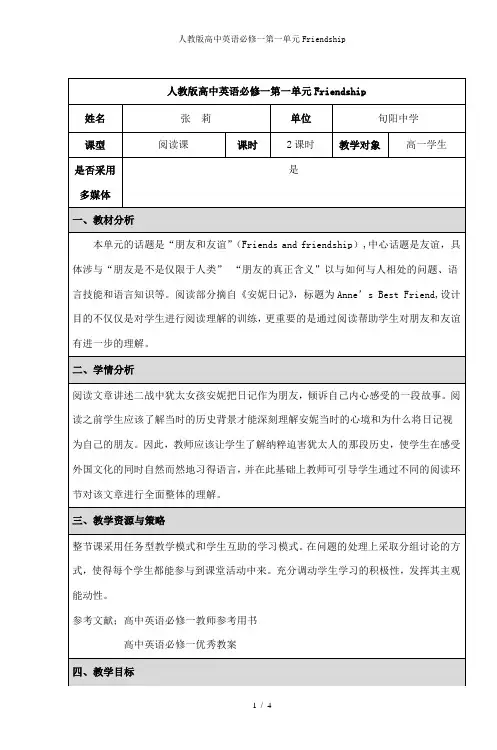
专家点评(交大附中陈江丽)
本节课的教材分析很到位,与论述了本单元的话题,也阐述了本节阅读课的话题和主线。
教学目标与教学重难点结合的很好,都符合阅读课的基本原则和特点。
学情分析不具体。
学情分析是对自己所教授的学生的基本学习情况的分析,包括学生的英语学习基础,英语学习动机与兴趣是否很强烈,有哪些优势,又有哪些劣势等。
本教学设计中的学情分析实际应该是教材背景的分析。
教学环节缺失,不完整。
目前较为常用的是5p教学环节:preparation, presentation, practice, production, progress. Preparation是热身环节,主要目的是激活,迁移,铺垫;presentation 是呈现,感知环节,是呈现新的语言现象的环节。
Practice是操练,体验环节,达到对刚才呈现的语言现象的内化,吸收和深层理解;production是生成环节,真实地运用语言,培养学生综合运用语言的能力,是“学了就用”的体现;progress 是巩固和提高环节,主要是通过小结,检测等评价方式对学生所学的内容进行检测和巩固。
因此建议教学设计的教学环节部分应按照这些步骤设计。

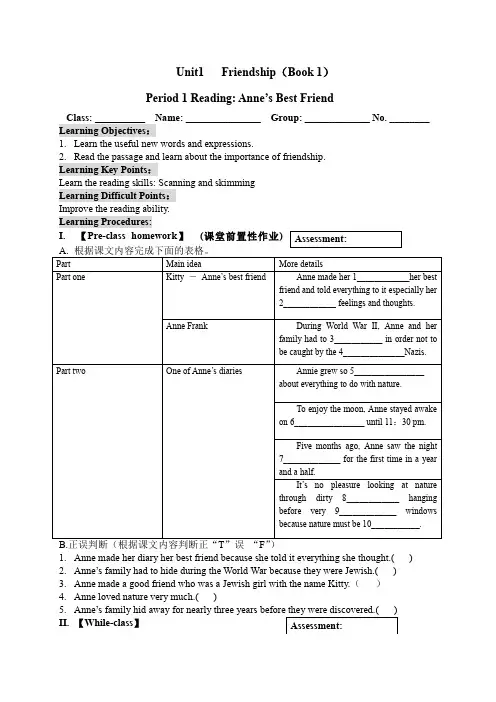
Unit1 Friendship (Book 1) Period 1 Reading: Anne ’s Best FriendClass: __________ Name: _______________ Group: _____________ No. ________ Learning Objectives :1. Learn the useful new words and expressions.2. Read the passage and learn about the importance of friendship. Learning Key Points :Learn the reading skills: Scanning and skimming Learning Difficult Points : Improve the reading ability. Learning Procedures:I. 【Pre-class homework 】 (课堂前置性作业) A. 根据课文内容完成下面的表格。
Part Main ideaMore detailsPart oneKitty ― Anne ’s best friendAnne made her 1____________her best friend and told everything to it especially her 2____________ feelings and thoughts. Anne FrankDuring World War II, Anne and her family had to 3___________ in order not to be caught by the 4______________Nazis. Part two One of Anne ’s diariesAnnie grew so 5________________ about everything to do with nature. To enjoy the moon, Anne stayed awake on 6________________ until 11:30 pm. Five months ago, Anne saw the night 7_____________ for the first time in a year and a half.It ’s no pleasure looking at nature through dirty 8____________ hanging before very 9_____________ windows because nature must be 10___________.B.正误判断(根据课文内容判断正“T ”误 “F ”)1. Anne made her diary her best friend because she told it everything she thought.( )2. Anne ’s family had to hide during the World War because they were Jewish.( )3. Anne made a good friend who was a Jewish girl with the name Kitty.( )4. Anne loved nature very much.( )5. Anne ’s family hid away for nearly three years before they were discovered.( ) II. 【While-class 】Assessment: Assessment:Step 1 Lead-inStep 2 Group discussionDiscuss the pre-class homework in groups.Step 3 Consolidation:Reading comprehensionA.阅读理解(根据课文内容选择最佳答案)1.According to the diary, we can know Anne________.A.felt the same about nature before and after she hid awayB.didn’t experience nature for a year and a halfC.couldn’t look at nature through windowsD.wasn’t interested in nature at all2.How did Anne feel after she looked at nature on 15th June, 1944?A. She was very crazy.B. She was very calm.C. She was very disappointed.D. She was very ill.3. From the letter to Kitty, we can see that _________.A. Anne loved Kitty very muchB. Anne was in great need of freedomC. Anne loved to live indoors very muchD. Anne hated the dark and rainy evening4. Anne Frank and her family hid away for_________.A. over a yearB. over two yearsC. three yearsD. one year and a half5. According to Anne, a true friend is a person __________.A. that would laugh at youB. who makes you happyC. whom you can trustD. who could save your lifeB. 语法填空(根据课文内容完成短文)Anne lived in the Netherlands during World War. Her family was Jewish1.___________ they had to hide or they would be2._____________(catch) by theGerman Nazis during that time. She wasn’t able to go outdoors for so long3._____________she had grown so crazy4._____________ everything to do with nature.One evening, she stayed awake 5. ____________ purpose to have a good look at the moon by herself .But she didn’t dare open a window. Another time she happened to be upstairs at dusk 6. _____________ the window was open. The dark, rainy evening, the thundering clouds held her 7._____________ (entire) in their power. It was the first time in a year and a half 8. _____________ she’d seen the night face to face.Anne felt very lonely without seeing her old friends. So she had to make a new friend, her diary Kitty, whom she could tell everything 9._____________. 10____________ (sad), at last, her family were discovered and caught by the German Nazis sometime later.Step4.PresentationStep5.SummaryIII.【Post-class】Self- reflectionKeys:I. 【Pre-class homework】A. 1. diary 2. deepest 3. hide 4. German 5. crazy6.purpose7. face to face8. curtains9. dusty 10. experienced B. TTFTFStep 3 Consolidation :Reading comprehension A. BCBBC B.1. so2. caught3. that4. about5. on6. when7. entirely8. that9. to 10. SadlyPeriod 2 Language focus in Reading 1Class: __________ Name: _______________ Group: _____________ No. ________ Learning Objectives :1. Learn and grasp the important useful new words and expressions.2. Learn the important useful sentences and patterns.3. Make sentences after the useful expressions. Learning Key points :Grasp the usages of such important new words and expressions. Learning Difficult Points :Understand some difficult and long sentences. Learning Procedures :I. 【Pre-class homework 】 (课堂前置性作业) Make sentences using the following words and phrases:1. upset 2. ignore 3. calm … down 4. be concerned about 5. go through 6. set down 7. on purpose8. suffer fromII. 【While-class 】 Step 1 Lead-in Step 2 Group discussionDiscuss the pre-class homework in groups. Step 3 Consolidation1. Anne Frank wanted the first kind, so she made her dairy her best friend. 完成句子:(1)在英语学习中,我把他当作老师。
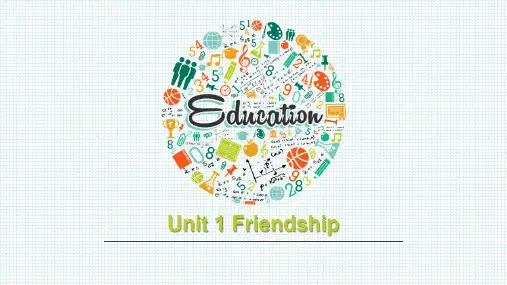
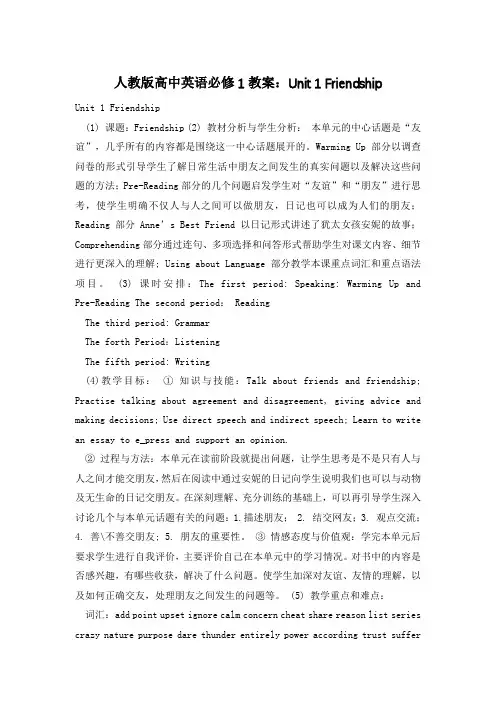
人教版高中英语必修1教案:Unit 1 FriendshipUnit 1 Friendship(1) 课题:Friendship (2) 教材分析与学生分析:本单元的中心话题是“友谊”,几乎所有的内容都是围绕这一中心话题展开的。
Warming Up部分以调查问卷的形式引导学生了解日常生活中朋友之间发生的真实问题以及解决这些问题的方法;Pre-Reading部分的几个问题启发学生对“友谊”和“朋友”进行思考,使学生明确不仅人与人之间可以做朋友,日记也可以成为人们的朋友;Reading部分Anne’s Best Friend以日记形式讲述了犹太女孩安妮的故事;Comprehending部分通过连句、多项选择和问答形式帮助学生对课文内容、细节进行更深入的理解; Using about Language 部分教学本课重点词汇和重点语法项目。
(3) 课时安排:The first period: Speaking: Warming Up and Pre-Reading The second period: ReadingThe third period: GrammarThe forth Period:ListeningThe fifth period: Writing(4)教学目标:① 知识与技能:Talk about friends and friendship; Practise talking about agreement and disagreement, giving advice and making decisions; Use direct speech and indirect speech; Learn to write an essay to e_press and support an opinion.② 过程与方法:本单元在读前阶段就提出问题,让学生思考是不是只有人与人之间才能交朋友,然后在阅读中通过安妮的日记向学生说明我们也可以与动物及无生命的日记交朋友。
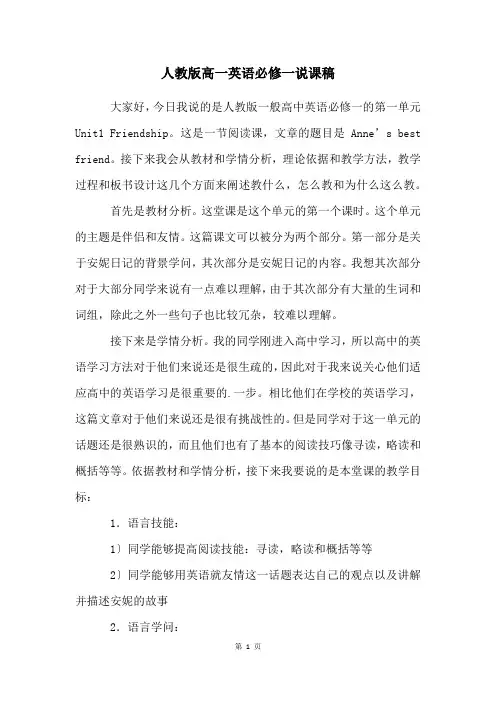
人教版高一英语必修一说课稿大家好,今日我说的是人教版一般高中英语必修一的第一单元Unit1 Friendship。
这是一节阅读课,文章的题目是Anne’s best friend。
接下来我会从教材和学情分析,理论依据和教学方法,教学过程和板书设计这几个方面来阐述教什么,怎么教和为什么这么教。
首先是教材分析。
这堂课是这个单元的第一个课时。
这个单元的主题是伴侣和友情。
这篇课文可以被分为两个部分。
第一部分是关于安妮日记的背景学问,其次部分是安妮日记的内容。
我想其次部分对于大部分同学来说有一点难以理解,由于其次部分有大量的生词和词组,除此之外一些句子也比较冗杂,较难以理解。
接下来是学情分析。
我的同学刚进入高中学习,所以高中的英语学习方法对于他们来说还是很生疏的,因此对于我来说关心他们适应高中的英语学习是很重要的.一步。
相比他们在学校的英语学习,这篇文章对于他们来说还是很有挑战性的。
但是同学对于这一单元的话题还是很熟识的,而且他们也有了基本的阅读技巧像寻读,略读和概括等等。
依据教材和学情分析,接下来我要说的是本堂课的教学目标:1.语言技能:1〕同学能够提高阅读技能:寻读,略读和概括等等2〕同学能够用英语就友情这一话题表达自己的观点以及讲解并描述安妮的故事2.语言学问:1〕同学能够把握一些生词和词组像是German, on purpose,in order to, at dusk, power等等3.情感看法:1〕同学知道生活的美妙之处,对生活保持乐观的看法4.文化意识:1〕同学能够知道一些二战的学问特殊是犹太人的历史5.学习策略:1〕同学通过上网搜集安妮的资料来提高资源策略2〕同学通过小组商量等来提高交际策略重点:1)同学能够提高他们的阅读技巧像是略读,寻读,概括等等2)同学能够用英语就友情这一话题表达自己的观点以及讲解并描述安妮的故事难点:1)同学能够用英语就友情这一话题表达自己的观点以及讲解并描述安妮的故事下面我要说的是理论依据和教学方法.依据英语新课程标准,英语课堂应当以同学为中心,同学在课堂中起主导作用,所以在我的课上我会给同学足够的时间去表达他们的观点和操练英语.除此之外,我还会先激活同学的旧学问来关心他们学习新学问。
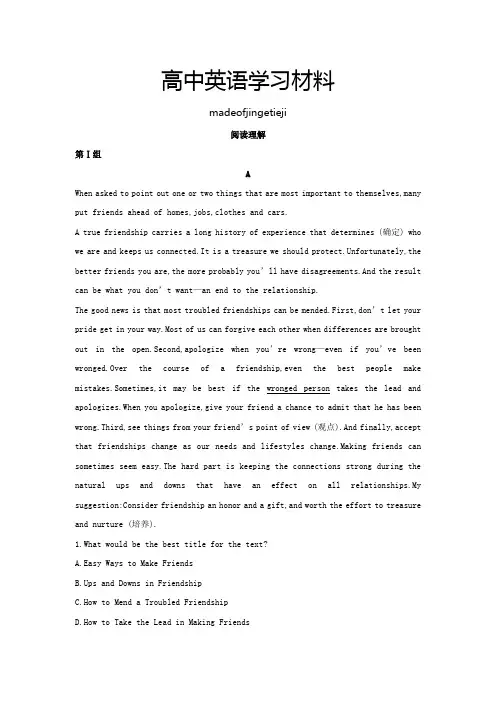
高中英语学习材料madeofjingetieji阅读理解第Ⅰ组AWhen asked to point out one or two things that are most important to themselves,many put friends ahead of homes,jobs,clothes and cars.A true friendship carries a long history of experience that determines (确定) who we are and keeps us connected.It is a treasure we should protect.Unfortunately,the better friends you are,the more probably you’ll have disagreements.And the result can be what you don’t want—an end to the relationship.The good news is that most troubled friendships can be mended.First,don’t let your pride get in your way.Most of us can forgive each other when differences are brought out in the open.Second,apologize when you’re wrong—even if you’ve been wronged.Over the course of a friendship,even the best people make mistakes.Sometimes,it may be best if the wronged person takes the lead and apologizes.When you apologize,give your friend a chance to admit that he has been wrong.Third,see things from your friend’s point of view (观点).And finally,accept that friendships change as our needs and lifestyles change.Making friends can sometimes seem easy.The hard part is keeping the connections strong during the natural ups and downs that have an effect on all relationships.My suggestion:Consider friendship an honor and a gift,and worth the effort to treasure and nurture (培养).1.What would be the best title for the text?A.Easy Ways to Make FriendsB.Ups and Downs in FriendshipC.How to Mend a Troubled FriendshipD.How to Take the Lead in Making Friends2.The “wronged person”underlined in the text refers to a person .A.who has been mistaken for anotherB.who has been blamed unfairlyC.who has treated friends badlyD.who has admitted his mistakes3.According to the text,a friendship can last long only if .A.we have much in commonB.we know our friends’ mistakesC.we treat our disagreements wiselyD.we have known one another for long4.What should we do if we follow the author’s second suggestion?A.Stick to our own points of view.B.Avoid making mistakes.C.Make an apology first.D.Change our lifestyles.【语篇解读】本文讲述了如何去挽救处于崩溃边缘的友谊。
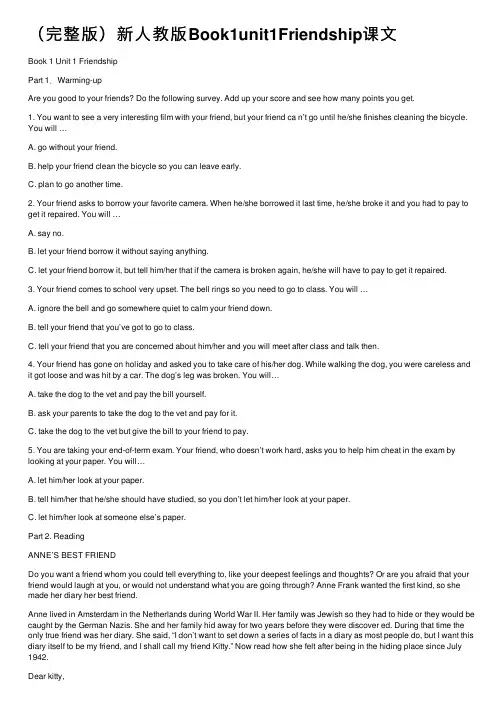
(完整版)新⼈教版Book1unit1Friendship课⽂Book 1 Unit 1 FriendshipPart 1.Warming-upAre you good to your friends? Do the following survey. Add up your score and see how many points you get.1. You want to see a very interesting film with your friend, but your friend ca n’t go until he/she finishes cleaning the bicycle. You will …A. go without your friend.B. help your friend clean the bicycle so you can leave early.C. plan to go another time.2. Your friend asks to borrow your favorite camera. When he/she borrowed it last time, he/she broke it and you had to pay to get it repaired. You will …A. say no.B. let your friend borrow it without saying anything.C. let your friend borrow it, but tell him/her that if the camera is broken again, he/she will have to pay to get it repaired.3. Your friend comes to school very upset. The bell rings so you need to go to class. You will …A. ignore the bell and go somewhere quiet to calm your friend down.B. tell your friend that you’ve got to go to class.C. tell your friend that you are concerned about him/her and you will meet after class and talk then.4. Your friend has gone on holiday and asked you to take care of his/her dog. While walking the dog, you were careless and it got loose and was hit by a car. The dog’s leg was broken. You will…A. take the dog to the vet and pay the bill yourself.B. ask your parents to take the dog to the vet and pay for it.C. take the dog to the vet but give the bill to your friend to pay.5. You are taking your end-of-term exam. Your friend, who doesn’t work hard, asks you to help him cheat in the exam by looking at your paper. You will…A. let him/her look at your paper.B. tell him/her that he/she should have studied, so you don’t let him/her look at your paper.C. let him/her look at someone else’s paper.Part 2. ReadingANNE’S BEST FRIENDDo you want a friend whom you could tell everything to, like your deepest feelings and thoughts? Or are you afraid that your friend would laugh at you, or would not understand what you are going through? Anne Frank wanted the first kind, so she made her diary her best friend.Anne lived in Amsterdam in the Netherlands during World War II. Her family was Jewish so they had to hide or they would be caught by the German Nazis. She and her family hid away for two years before they were discover ed. During that time the only true friend was her diary. She said, “I don’t want to set down a series of facts in a diary as most people do, but I want this diary itself to be my friend, and I shall call my friend Kitty.” Now read how she felt after being in the hiding place since July 1942.Dear kitty,I wonder if it’s because I haven’t been able to be outdoors for so long that I’ve grow n so crazy about everything to do with nature. I can well remember that there was a time when a deep blue sky, the song of the birds, moonlight and flowers could never have kept me spellbound. That’s changed since I was here.…For example, one evening when it was so warm, I stay ed awake on purpose until half past eleven in order to have a good look at the moon by myself. But as the moon gave far too much light, I didn’t dare open a window. Another time some months ago, I happened to be upstairs at dusk when the window was open. I did n’t go downstairs until the window had to be shut. The dark, rainy evening, the wind, the thunder ing clouds held me entirely in their power; it was the first time in a year and a half that I’d seen the night face to face……Sadly…I am only able to look at nature through dirty curtain s hang ing before very dusty It’s no pleasure looking through these any longer because nature is one thing that really must be experience d.Yours,AnnePart 3.Using Language1.Dear Miss Wang,I am having some trouble with my classmates at the moment. I’m getting along well with a boy in my class. We often do homework together and we enjoy helping each other. We have become really good friends. But other students have started gossiping. They say that this boy and I have fallen in love. This has made me angry. I don’t want to end the friendship, but I hate others gossiping. What should I do?Yours,Lisa2. Miss Wang has receive d a letter from Xiaodong. He is also asking for some advice. Read the letter on the right carefully and help Miss Wang answer it.Dear Miss Wang,I’m a student from Huzhou Senior High School. I have a problem. I’m not very good at communicating with people. Although I try to talk to my classmates, I still find it hard to make good friends with them. So I feel quite lonely sometimes. I do want to change this situation, but I don’t know how. I would be grateful if you could give me some advice.Yours,Xiaodong。
Unit 1 friendshipParticipants: 靳燕,黄洋,董妮娅,仝亚军,李桂秀,吴晓,邹舍龙School: Tai Zhou Senior Middle Schoolaims and demands2.Suggested teaching notes1). Analyses of the teaching contents;This unit is about friendship, and nearly all the teaching materials center on it. Warming up---The questionnaire leads students to think and talk aboutfriendship, get to know the problems between friendsand seek solutions, which makes preparations for thefurther teaching in topics, background and vocabulary.Pre-reading---The questions prompt students to think critically aboutfriends and friendship in reality, alerting them to the factthat besides people, a diary can be a friend, too./Reading--- The diary by theJewish girl Anne gave a glimpse of her lifeduring her family’s shelter in Amsterdam from the GermanNazis’ killing in world war 2. she treats the diary as her best friend,and in it reveals her longing for a normal life and close contact withnature, which helps her get through the days.Comprehending---It helps students further understand the text by doingmultiple choices, questions and answers, andmatching.Learning about language---It teaches the important expressions andstructures and grammar: direct and indirect:speeches.Using language---The two letters, listening, questionnaire design, letterwriting and fun writing prepares students to furthertalk about friendship, especially the problems withmisunderstanding, and unfriendliness, thusstrengthening students’ abilities to practicelanguage, discover, and solve problems.Summing up---It summarizes the whole contents of this unit from the(aspects of topics, vocabulary and grammar.Learning tip--- This part encourages students to form the habit of writinga diary.Integrating skills--- The text introduces the way Hawaiians expressfriendship, to get students to realize the culturaldifferences in the values of friendship in additionits importance in all cultures.、2) Making of the teaching planThis unit centers on friends and friendship, exploring different types offriendship with particular attention to that one can develop with oneself,., the comfort and support one seeks from an imaginary friend.Students are expected to come to be truly aware of the qualities andconducts that make a good friend, display and develop the ability tocope with misunderstanding, conflicts and problems related tofriendship, and give advice on it. The concept that even an ordinary"thing can be a friend should break down the traditional belief in the interpersonal nature of friendship. Also, the comparison of similarities dissimilarities in friendship comprehension between the East and theWest leads students to know better the values of friendship in Westerns’eyes. All in all, this unit promises to unveil the true essence of friendshipand helps students to lead a more friendly and harmonious life.Thus, based on the theme, contents and teaching objectives, the whole3. Teaching plans for each periodPeriod 1 Warming-up and Speaking1. Teaching objectives:1) Target languageI (don’t) think…… I (don’t) think so. I (don’t) agree..I believe……That’s correct. In my opinion, ……2) Ability goalsa.Describe your friends in Englishb.Figure out the problems between friends and then find different ways to solvethe problems.3)Learning ability goalsa.To encourage students to think and talk about friends and friendship by usingsome phrases and structures.b.To learn to solve problems that may occur between friends.c. To cultivate the students to form the good habit of learning English in SeniorMiddle School.》2. Teaching important points:e the given adjectives and sentence structures to describe one of yourfriends.b.Learn to evaluate friends and friendship.3. Teaching difficult points:a.Work together with partners and describe one of your good friends.b.Discuss with partners and find out ways to solve the problems.!4. Teaching methodsa.Task-based teaching and learningb.Cooperative learningc.Discussion5. Teaching aids:CAI"6. Teaching procedures and ways:Step 1 Lead-in and Warming-upBefore the lesson, the teacher can arouse the students’ interests by showing a video of Auld Lang Syne .At the beginning of the first class, we can get the students to talk about their summer holidays. The students can talk freely as they like.1.How did you spend your summer holidays How did you feel Whatdid you do in your summer holidays What did you do in your sparetime2.What do you think of our new school Do you like it Could you saysomething about it3.Do you like making friends How do get in touch with your friends Doyou have many friends Where are they now Do you have any oldfriends in our school Have you made any new friends in our class !Step 2 Think it over1. Give a brief description of one of your friends. The following phrasesand structures may be helpful:His/Her name is ……He /She is …… years old.He /She likes …… and dislikes ……He /She enjoys …… and hates……He /She is very kind/friendly/……?When /Where we got to know each other.2. What types of friendship do you have Please tick them out. Then fill inthe blanks.girl friends boy friends pen friendslong -distance friends friends of the same agee-friends (friends over the internet) friends across generationsunusual friends like animals, books……1).______ is /are most important to you.2). You spend most of your free time with ____.`3). You will share your secrets with _____.4). When in trouble, you will first turn to _____.Step 3 Make a survey1. List some qualities of a good friend or your ideal friend. Have the students get into groups of four to find out what each has listed.Tell your partner your standards of good friends by using the following structure:I think a good friend sho uld (not) be……In my opinion, a good friend is someone who……1.…2.Have a member of each group report on what their lists have in common andlist them on the board.3.Ask the class whether or not they agree with all the qualities listed.4.Then have the students do the survey in the textbook.5.Have the students score their survey according to the scoring sheet on page 8.6.The teacher ask some students how many points they got for the survey andassess their values of friendship:★ 4~7 points: You are not a good frien d. You either neglect your friend’s needs or just do what he/she wants you to do. You should think more about what a good friend needs to do.★8~12 points: You are a good friend but you sometimes let your friendship become too important, or you fail to sh ow enough concern for your friend’s needs and feelings. Try to strike a balance between your friend’s needs and your own responsibilities.★13+ points: You are an excellent friend who recognizes that to be a good friend you need balance your needs and you r friend’s. Well done.?(You may also show your students the results above and let themselves self-reflect upon their own values of friendship)Step 4 Talking and sharing( work in pairs)1. If your best friend does something wrong, what will you doTry to use the following phrases:I (don’t) think…… I (don’t) think so.I (don’t) agree. I believe……That’s correct. In my opinion, ……2. What is a friendA British newspaper once offered a prize for the best definition(定义) of a friend. If you were the editior, choose the best one from the following entries(条目), and explain why.One who understands my silence.A friend in need is a friend indeed.Friends are just the people who share your happiness and sorrow.When you look at your watch at 4 am, but still know you can call!them and wake them up, and they’ll still want to talk to you ,that’sfriendship.To have a friend, you need to be a good friend.Step 5 Group work (output)The teacher can give each group one of these questions below to talk about. Then let the class share their ideas. It’s better to stimulate the students to express their own opinions about these questions.1.Do you think it is a good idea to borrow money from your friendWhy and Why not>2. What factors may cause the breakdown of a good friendship3. What can be your unusual friend besides human beings And whyStep 6 homework1.Write down a short passage about your ideas /the factors/your unusualfriends.2.Prepare for the new lesson.Period 2 Reading “Anne’s Best F riend”!1. Teaching objectives:1) To develop the students’ reading ability, learn to use some reading strategies such as guessing, key sentences, skimming and so on;2). To get the students to realize the importance of friends and friendship, and to tell true friends from false friends;3). To grasp some useful words and expressions in this passage, such as on purpose, be crazy about etc.;4). To learn the writing style of this passage.2. Teaching method: Task-based teaching~3). Teaching procedure:Step1. Please enjoy three pieces of music and find out what they are about.2 .Why do you think friends are important to you3. What do you think a good friend should be like List the good qualities a good friend should have .4. Have you ever considered making friends with animals, plants or even an object Why or why notStep}1. Try to guess what Anne’s friend is and what the passage is about by reading the title and having a quick at the pictures in this passage without reading it.2. Skimming the first two paragraphs to confirm your guessing.1) What was Anne’s best friend Why did she make friends with it2) Did she have any other true friends then Why3) What is the difference b etween Anne’s diary and those of most people4) Do you keep a diary What do you think most people set down in their diaries5) We are going to read one of Anne’s diaries .but before reading ,can you tell me what the diary is about with the help of one key sentence in the 2nd paragraph3. Reading of Anne’s diary…How she felt in the hiding placeTwo examples to show her feelings thenStepwould you miss most if you went into hiding like Anne and her family Give your reasons.workWork in groups to decide what you would do if your family were going to be killed just because they did something the Emperor did not like.Where would you plan to hide?How would you arrange to get food given to you every day'What would you do to pass the time------3. Discovering useful words and expressionsComplete the following sentences, using words and expressions from Reading1) She has grown _______ about computer games.2) Was it an accident or did David do it on _______3) From the beginning ,Paul made it clear that he would be ______ (完全地)in control.4) He used to work _______ even in the middle of winter.`5) Just the _______ of more food made her feel sick.6) You had better have a _________ talk with him.7) Born in a poor family, the manager _________ lots of hardships in his childhood.8) A diary is often kept to ________ what happens in people’s daily lives.Step about friends and friendshipare many proverbs about friends and friendship. Choose the one you agree with and explain why, then choose one you disagree with and explain why.A friend in need is a friend indeed."Friends are like wine; the older, the better.A friend to all is a friend to none.The same man cannot be both friend and flatterer(阿谀奉承者).False friends are worse than open enemies.Walking with a friend in the dark is better than walking alone in the light.2. We have talked about friends and friendship today, can you write one or two sentences to express your understanding of friends and friendship.Step :…1. Interview a high school student, a businessman, a police officer and a housewife to find out their opinions about friends and friendship. Write a report to share it with the whole class.2. Describe one of your best friends following the writing style of this passage. Ending: Let’s sing this song about friends togetherPeriod3 Grammar1.Teaching objectivesLearn to use direct speech and indirect speech:2. Teaching important pointSummarize the rules of Direct Speech and Indirect Speech.3. Teaching difficult pointLearn about the special cases in which the tenses shouldn’t be changed.4. Teaching methodsDiscussing, summarizing and practicing.|5. Teaching proceduresStep1 Lead inT: In the last lesson, we learned Anne Frank’s story. She is telling h er stories to two of her friends—you and Tom. Tom has something wrong with his ears,so you have to repeat Anne’s sentences, using indirect speech. Sometimes you explain Tom’s sentences to Anne.“I have to stay in the hiding place.” said Anne. →Anne said she had to stay in the hiding place.“Do you feel sad when you are not able to go outdoors” Tom asked Anne. →Tom asked Anne if/whether she felt sad when she was not able to go outdoors.'“I don’t want to set down a series of facts in a diary,” said Anne.→Anne said that she didn’t want to set down a series of facts in a diary.“What do you call your diary” Tom asked. →Tom asked what she called her diary.Ss go on this topic by themselves.Step2 GrammarT: Now let’s look at these sentences again. If we w ant to change Direct Speech into Indirect Speech, what should be changed:Ss discuss by themselves.Ss: sentence structures, tenses, pronouns, adverbials of time and place and verbs should be changed.T: Quite right. Look at the form on the screen. These are the rules.直接引语变成间接引语时,要注意以下几点:人称变化、时态变化、宾语从句要用陈述句语序。
Book 1 Unit 1 Friendship单元复习卷一、根据汉语,写出单词或词组的正确形式。
1. The Impressionists (印象派画家) were the first painters to work (户外).2. The problem you are facing is common among our (青少年).3. That mistake could make me lose an important business (伙伴)!4. I need to pack up my things in the (手提箱) very quickly.5. Parents are all about(关心,挂念)their children.6. Does he (遭受,患病)any kind of mental disability?7. I happened to be upstairs (在黄昏时刻) when the window was open.8. Please draw the (curtain); the sunlight is too bright.9. Most teenagers (不同意,不赞成) theirs parents on most things.10. —So you think we should sell the house?—(exact)二、根据所给汉语,完成下列句子。
1. (把……加起来) your score and see how many points you can get.2. Every doctor has had to try their best to (使……平静下来) their patients.3. (经历) those things that seem impossible, and achieve what we never believed we could.4. Mobile phone users have developed (一系列的) symbols (符号) to show how they feel.5. (为了) find a better job, he decided to study a second foreign language.6. Cinderella left her shoe on the stairs (故意地).7. I have often dreamed of talking (面对面地) with you.8. Once a friend and I (把……打包) some sandwichesfor an outing.9. They say that the boy and I have (相爱). This made me angry.10. I started a new hobby. I collecting stamps. (对…厌烦).三、根据提示,将下列句子译成英语。
Book 1 Unit 1 FriendshipPart 1.Warming-upAre you good to your friends? Do the following survey. Add up your score and see how many points you get.1. You want to see a very interesting film with your friend, but your friend ca n’t go until he/she finishes cleaning the bicycle. You will …A. go without your friend.B. help your friend clean the bicycle so you can leave early.C. plan to go another time.2. Your friend asks to borrow your favorite camera. When he/she borrowed it last time, he/she broke it and you had to pay to get it repaired. You will …A. say no.B. let your friend borrow it without saying anything.C. let your friend borrow it, but tell him/her that if the camera is broken again, he/she will have to pay to get it repaired.3. Your friend comes to school very upset. The bell rings so you need to go to class. You will …A. ignore the bell and go somewhere quiet to calm your friend down.B. tell your friend that you’ve got to go to class.C. tell your friend that you are concerned about him/her and you will meet after class and talk then.4. Your friend has gone on holiday and asked you to take care of his/her dog. While walking the dog, you were careless and it got loose and was hit by a car. The dog’s leg was broken. You will…A. take the dog to the vet and pay the bill yourself.B. ask your parents to take the dog to the vet and pay for it.C. take the dog to the vet but give the bill to your friend to pay.5. You are taking your end-of-term exam. Your friend, who doesn’t work hard, asks you to help him cheat in the exam by looking at your paper. You will…A. let him/her look at your paper.B. tell him/her that he/she should have studied, so you don’t let him/her look at your paper.C. let him/her look at someone else’s paper.Part 2. ReadingANNE’S BEST FRIENDDo you want a friend whom you could tell everything to, like your deepest feelings and thoughts? Or are you afraid that your friend would laugh at you, or would not understand what you are going through? Anne Frank wanted the first kind, so she made her diary her best friend.Anne lived in Amsterdam in the Netherlands during World War II. Her family was Jewish so they had to hide or they would be caught by the German Nazis. She and her family hid away for two years before they were discover ed. During that time the only true friend was her diary. She said, “I don’t want to set down a series of facts in a diary as most people do, but I want this diary itself to be my friend, and I shall call my friend Kitty.” Now read how she felt after being in the hiding place since July 1942.Dear kitty,I wonder if it’s because I haven’t been able to be outdoors for so long that I’ve grow n so crazy about everything to do with nature. I can well remember that there was a time when a deep blue sky, the song of the birds, moonlight and flowers could never have kept me spellbound. That’s changed since I was here.…For example, one evening when it was so warm, I stay ed awake on purpose until half past eleven in order to have a good look at the moon by myself. But as the moon gave far too much light, I didn’t dare open a window. Another time some months ago, I happened to be upstairs at dusk when the window was open. I did n’t go downstairs until the window had to be shut. The dark, rainy evening, the wind, the thunder ing clouds held me entirely in their power; it was the first time in a year and a half that I’d seen the night face to face……Sadly…I am only able to look at nature through dirty curtain s hang ing before very dusty It’s no pleasure looking through these any longer because nature is one thing that really must be experience d.Yours,AnnePart 3.Using Language1.Dear Miss Wang,I am having some trouble with my classmates at the moment. I’m getting along well with a boy in my class. We often do homework together and we enjoy helping each other. We have become really good friends. But other students have started gossiping. They say that this boy and I have fallen in love. This has made me angry. I don’t want to end the friendship, but I hate others gossiping. What should I do?Yours,Lisa2. Miss Wang has receive d a letter from Xiaodong. He is also asking for some advice. Read the letter on the right carefully and help Miss Wang answer it.Dear Miss Wang,I’m a student from Huzhou Senior High School. I have a problem. I’m not very good at communicating with people. Although I try to talk to my classmates, I still find it hard to make good friends with them. So I feel quite lonely sometimes. I do want to change this situation, but I don’t know how. I would be grateful if you could give me some advice.Yours,Xiaodong。
阅读表达阅读下面短文并回答问题(请注意题后的词数要求)。
Passage 1Too many people want others to be their friends,but they don’t give friendship back.That is why some friendships don’t last very long.To have a friend,you must learn to be one.You must learn to treat your friend the way you want your friend to treat you.Learning to be a good friend means learning three rules:be honest;be generous;be understanding.Honesty is where a good friendship starts.Friends must be able to trust one another.If you don’t tell the truth,people usually find out.If a friend finds out that you haven’t been honest you may lose your friend’s trust.Good friends always count on one another to speak and act honestly.Generosity means sharing and makes a friendship grow.You don’t have to give your lunch money or your clothes,of course.Instead you have to learn how to share things you enjoy,like hobbies and your interests.Naturally you will want to share your ideas and feelings.These can be very valuable to friends.They tell your friends what is important to you.By sharing them you help your friends know you better.Sooner or later everyone needs understanding and help with problems.Something may go wrong at school.Talking about the problem can make it easier to solve.Turning to a friend can be a first step in solving the problem.So to be a friend you must listen and understand.You must try to put yourself in your friend’s place so you can understand the problem better.No two friendships are ever exactly alike(相似的,同样的). But all true friendships have three things in common.If you plan to keep your friends,you must practice honesty,generosity and understanding.1.The best title of the passage is .2.What does a good friendship begin with?3.By sharing (no more than 4 words) you help your friends know you better.4.What can be a first step in solving the problem?(no more than 4 words).5.将画线部分翻译成汉语。
Book 1 Unit1 Friendship本单元所学的词汇总结短语:动词:名词:形容词:副词:I. 语法填空:在空白处填入一个适当的单词或用括号里单词的适当形式填空1. The boss was _____________ (entire) satisfied with what the workers hand done.2. The room has been empty for a long time and all the furniture(家具) is _________(dust) on the surface.3. Alan looked at him and said ____________ (calm), “I don’t believe you.”4. Our parents are __________ (concern) about our health. As far as I’m _________(concern), we should talk with them and tell them our ___________ (concern).5. Look at the time! We _____________________ (be) at the theater 10 minutes ago.6. After he came to power, everyone said he was a _____________ (power) leader,but now he felt so _____________ (power) that he even couldn’t save his son. 7. Anne and her friends were all born in ____________ (German), that is to say, theywere all _____________ (German).8. It was in the street ____________ Mary met an old beggar(乞丐) yesterday.9. It’s no pleasure ______________ (talk) with such a boring man.It’s no pleasure ______________ (cheat) by others.10. It is the second time that I _____________ (be) in the city. What great changes!11. While ______________ (visit) the city, they received a warm welcome.12. I will be grateful ______ you if you give me some advice on how to make friends.13. I am not fond of pop music because I often have trouble __________________(understand) the words.14. A few people __________ (agree) while most people ___________ (agree), so no_________________ (agree) was made.15. Would you please join us _________ discussing the way to solve the problem?16. She ____________ (like) being asked to do any housework, but she ___________(like) dancing very much.II. 单句改错:找出并改正每句话里的一处错误1. It was at school where he met his English teacher.2. The boy wasted an entirely morning in playing computer games.3. It was no pleasure watch TV at home alone, so I went to the bar(网吧).4. While walked his dog in the park yesterday, Bob heard someone shouting for help.5. It was the first time that they have visited the Great Wall last week.6. The patient said that he had suffered a bad cold.7. My son wrote to tell me that he was getting on well his study abroad.8. I am having some trouble in my spoken English now.9. It took a long time for this area to recover the effects of the earthquake.10. My teacher gave me some good advices on how to improve my listening ability.11. I would like make a friends with Tom because he is a warm-hearted man.The KeysI. 语法填空:1. entirely2. dusty3. calmly4. concerned; concerned; concern5. should have been6. powerful; powerless7. Germany; Germans.8. that9. talking; being cheated 10. have been 11. visiting 12. to 13. understanding 14. agreed; disagreed; agreement 15. in 16. dislikes; likesII. 单句改错:1. It was at school where he met his English teacher.that2. The boy wasted an entirely morning in playing computer games.entire3. It was no pleasure watch TV at home alone, so I went to the bar(网吧).watching4. While walked his dog in the park yesterday, Bob heard someone shouting for help.walking5. It was the first time that they have visited the Great Wall last week.had6. The patient said that he had suffered /\ a bad cold.from7. My son wrote to tell me that he was getting on well /\ his study abroad.well8. I am having some trouble in my spoken English now.with9. It took a long time for this area to recover /\ the effects of the earthquake.from10. My teacher gave me some good advices on how to improve my listening ability.advice11. I would like make a friends with Tom because he is a warm-hearted man.建议信I. 常见模版:Dear …,I’m sorry you’re having trouble in / with _______________ (面临的具体问题). However, the situation can be changed if you take my advice. Here are some tips to help you:Firstly, why not _________________ (建议一). If you do this, I’m sure you will _________________ (结果一). Secondly, you should / can _________________ (建议二). That way, you will _________________ (结果二). Thirdly, it would be a good idea if you try to _________________ (建议三). By doing this, you will probably _________________ (结果三).I hope you will find these ideas useful.Yours,Li HuaII. 增分佳句:1. 常用开头句式:①I know you are now having trouble in communicating with others, and youoften feel lonely.我知道你现在在与人交流方面有些麻烦,而且经常感到孤独。
②I’m glad to receive your letter asking for my advice on …我很高兴收到你就……向我征求建议的信。
③Here are some tips / suggestions / advice to help you.这里有一些帮助你的建议。
④I think you can make it if you follow the advice below.如果你听从以下建议,我觉得你会做到的。